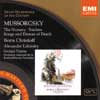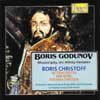Mussorgsky Song Cycles
If you thought you knew Boris Christoff from his operatic work, think again…
View record and artist detailsRecord and Artist Details
Composer or Director: Modest Mussorgsky
Genre:
Vocal
Label: Great Recordings of the Century
Magazine Review Date: 7/2003
Media Format: CD or Download
Media Runtime: 79
Mastering:
Mono
ADD
Catalogue Number: 567993-2

Tracks:
| Composition | Artist Credit |
|---|---|
| Darling Savishna |
Modest Mussorgsky, Composer
Alexandre Labinsky, Piano Boris Christoff, Bass Modest Mussorgsky, Composer |
| (The) Nursery |
Modest Mussorgsky, Composer
Alexandre Labinsky, Piano Boris Christoff, Bass Modest Mussorgsky, Composer |
| Sunless |
Modest Mussorgsky, Composer
Alexandre Labinsky, Piano Boris Christoff, Bass Modest Mussorgsky, Composer |
| King Saul |
Modest Mussorgsky, Composer
Boris Christoff, Bass Georges Tzipine, Conductor Modest Mussorgsky, Composer ORTF National Orchestra |
| (The) Wild wind blows |
Modest Mussorgsky, Composer
Boris Christoff, Bass Georges Tzipine, Conductor Modest Mussorgsky, Composer ORTF National Orchestra |
| Songs and Dances of Death |
Modest Mussorgsky, Composer
Boris Christoff, Bass Georges Tzipine, Conductor Modest Mussorgsky, Composer ORTF National Orchestra |
| Mephistopheles' song of the flea |
Modest Mussorgsky, Composer
Boris Christoff, Bass Georges Tzipine, Conductor Modest Mussorgsky, Composer ORTF National Orchestra |
| Where art thou, little star |
Modest Mussorgsky, Composer
Alexandre Labinsky, Piano Boris Christoff, Bass Modest Mussorgsky, Composer |
| Gopak |
Modest Mussorgsky, Composer
Boris Christoff, Bass Georges Tzipine, Conductor Modest Mussorgsky, Composer ORTF National Orchestra |
| Lullaby |
Modest Mussorgsky, Composer
Alexandre Labinsky, Piano Boris Christoff, Bass Modest Mussorgsky, Composer |
Composer or Director: Modest Mussorgsky, Alexander Borodin, Nikolay Rimsky-Korsakov
Genre:
Opera
Label: Pearl
Magazine Review Date: 7/2003
Media Format: CD or Download
Media Runtime: 179
Mastering:
Mono
ADD
Catalogue Number: GEMS0188

Tracks:
| Composition | Artist Credit |
|---|---|
| Boris Godunov |
Modest Mussorgsky, Composer
André Bielecki, Shuisky; Missail; Krushchov Boris Christoff, Boris; Pimen; Varlaam, Bass Eugène Bousquet, Chernikovsky, Bass Eugenia Zareska, Marina; Feodor Issay Dobroven, Conductor Kim Borg, Rangoni; Shchelkalov, Bass Ludmila Lebedeva, Xenia, Soprano Lydia Romanova, Nurse; Hostess Modest Mussorgsky, Composer Nicolai Gedda, Grigory, Tenor ORTF National Orchestra Paris Russian Opera Chorus Raymond Bonte, Lavitsky, Bass |
| Songs and Dances of Death, Movement: Trepak (1875) |
Modest Mussorgsky, Composer
Alessandra Cesareo, Gherardino, Contralto (Female alto) Alexey Martinov, Young man, Tenor Boris Christoff, Bass Claudio Giombi, Spinelloccio, Bass Eleonora Jankovic, Zita, Mezzo soprano Eleonora Jankovic, Zita, Contralto (Female alto) Eleonora Jankovic, Zita, Mezzo soprano Gerald Moore, Piano Juan Pons, Gianni Schicchi, Baritone Midela d' Amico, Sister Dolcina, Soprano Modest Mussorgsky, Composer Ruggero Altavilla, Guccio, Bass Virgilio Carbonari, Notary, Baritone Yuri Marusin, Rinuccio, Tenor |
| Songs and Dances of Death, Movement: The field-marshal (1877) |
Modest Mussorgsky, Composer
Aristide Baracchi, Baron, Baritone Boris Christoff, Bass Erich Kunz, Figaro, Bass Franz Normann, Antonio, Bass Gerald Moore, Piano Gerda Sommerschuh, Cherubino, Mezzo soprano Gustav Neidlinger, Bartolo, Bass Liane Timm, Barbarina, Soprano Modest Mussorgsky, Composer Natale Villa, Marquis, Bass Res Fischer, Marcellina, Soprano Salvatore Baccaloni, Doctor, Bass |
| (2) Songs, Movement: The prophet |
Nikolay Rimsky-Korsakov, Composer
Boris Christoff, Bass Donald McIntyre, Wanderer, Bass-baritone Donald McIntyre, Wanderer, Bass-baritone Donald McIntyre, Wanderer, Bass-baritone Elisabeth Glauser, Rossweiße, Mezzo soprano Gwendoline Killebrew, Schwertleite, Mezzo soprano Gwendoline Killebrew, Schwertleite, Mezzo soprano Gwendoline Killebrew, Schwertleite, Contralto (Female alto) Heinz Zednik, Mime, Tenor Heinz Zednik, Mime, Tenor Heinz Zednik, Mime, Tenor Karen Middleton, Ortlinde, Soprano Marga Schiml, Siegrune, Soprano Marga Schiml, Flosshilde, Soprano Marga Schiml, Siegrune, Soprano Marga Schiml, Siegrune, Mezzo soprano Marga Schiml, Flosshilde, Mezzo soprano Marga Schiml, Flosshilde, Soprano Nikolay Rimsky-Korsakov, Composer Norma Sharp, Woodbird, Soprano Norma Sharp, Woodbird, Soprano Norma Sharp, Woodbird, Soprano Ortrun Wenkel, Erda, Contralto (Female alto) Ortrun Wenkel, Erda, Mezzo soprano Ortrun Wenkel, Erda, Mezzo soprano Philharmonia Orchestra Wilhelm Schüchter, Conductor |
| Song of the dark forest |
Alexander Borodin, Composer
Alexander Borodin, Composer Alfredo Giacomotti, Marquis, Bass Boris Christoff, Bass Gerald Moore, Piano Giovanni Foiani, Doctor, Bass Ileana Cotrubas, Violetta, Soprano Paul Friess, Servant, Tenor Paul Winter, Messenger, Bass Plácido Domingo, Alfredo Germont, Tenor Sherrill Milnes, Giorgio Germont, Baritone Stefania Malagù, Flora, Mezzo soprano Walter Gullino, Giuseppe, Tenor Walter Gullino, Giuseppe, Tenor Walter Gullino, Giuseppe, Tenor |
Author: Patrick O'Connor
While I would not want to discourage anyone who has never heard Christoff in Mussorgsky’s songs, it does seem rather perverse of EMI to put out only a single-CD selection now. I would imagine that anyone who is captivated by The Nursery, and then by Christoff’s more typically dramatic Songs and Dances of Death and the Sunless cycle, plus the seven other songs here, will want to hear the rest as soon as possible. Alan Blyth, reviewing the CD reissue, called it, ‘one of the all-time glories of the gramophone... unquestionably the bass’s most important legacy’.
Opinion has somewhat altered among Mussorgsky scholars since; for instance, in his recent biography of the composer John Brown calls the set ‘instructive in reflecting the attitudes and practices of that time’, and – referring to the orchestrations for Songs and Dances of Death – states ‘no reputable singer today would risk peddling such benign bowdlerisations’. Be that as it may, I can think of few other singers in the history of recording who could so engage one’s attention and admiration through three hours of songs by one composer. So, a hearty welcome to what I sincerely hope is Volume 1 of an eventual complete reissue of the set, something that truly deserves the title Great Recording.
Christoff’s voice and personality were so closely associated with the role of Boris Godunov that through all the years he appeared in the part, from the late 1940s until the mid-1970s, it was often difficult to think of any other interpreter (although George London, Ivan Petrov and Nicolai Ghiaurov all recorded it during that time). Christoff admirers may find themselves torn between the two reissues of Christoff’s Boris. The 1962 EMI version which I reviewed last month is a fuller account of the score. It’s in magnificent sound, and has some excellent supporting players and choral singing. This new Pearl transfer of the 1952 set has been made from RCA pressings, rather than the earlier HMV ones. According to the producer’s note, these American LPs ‘have a very wide frequency and dynamic range’.
Certainly the sound on these CDs is splendidly clear and free of distortion. I compared them with my 50-year-old HMV LPs, and to begin with I couldn’t detect that much difference. However, I experimented with various control settings and levels and, especially in the revolutionary scene in the last act, the sound really is sensational for a recording of this age.
The contrast between this and the later, stereo, Boris has more to do with his conception of the role. For the later set, he had delved deeper into the character, and used less obviously melodramatic effects. His voice, though, in 1952 had a greater freedom and beauty, especially in key moments such as the Coronation scene, and ‘I have attained the supreme power’. His impersonation of the monk Pimen has an impressive restraint, while the rogue Varlaam is over the top.
Among the supporting cast, Nicolai Gedda is in glorious voice as Grigory, known as the false Dmitri, but his part is cut – the whole of the duet with Rangoni is missing. Without this scene, the impulse of ‘Dmitri’ seems meaningless. (No doubt it was often omitted in the theatre at that time.) Eugenia Zareska sings the parts of Marina and the Tsarevitch Feodor. She is a really aristocratic, sensual Polish Princess, but unconvincing as a boy. Wassili Pasternak is a superbly crazy-sounding Simpleton.
Many people prefer this earlier Boris, but with both recordings now at mid-price the situation is pretty much 50-50. The quality of sound in the later set, and André Cluytens’ more reflective conducting, make it a more theatrically rounded experience. On this issue Issay Dobrowen really drives the big scenes hard and fast. The effect is nothing like a theatre but in the revolutionary scene the orchestra and chorus seem to be marching through the room (in mono!). To have this before the death of Boris seems more absurd than usual, but with CDs it’s easy to reverse the procedure and have what Mussorgsky intended.
As for the death scene, on Pearl it’s in close-up, with Christoff gasping into the microphone, whereas in 1962 the whole set-up is more elaborate, Boris placed in the middle with the monks advancing on him. The EMI issue comes with a full four-language libretto, but the Pearl has only a slim booklet with a brief plot synopsis. As bonus tracks Pearl offers unpublished takes of Christoff singing songs by Mussorgsky, Rimsky-Korsakov and Borodin – the last-named’s Song of the dark forest is mis-attributed to Tchaikovsky on the sleeve – that he recorded again later.
Having spent several days in the company of Christoff’s voice, I am left with an even greater regard for this magnificently gifted singer; off-stage he was no doubt as difficult and moody as many people have related, but this is hardly surprising when he was able to pour so much into each phrase, each song.
Discover the world's largest classical music catalogue with Presto Music.

Gramophone Digital Club
- Digital Edition
- Digital Archive
- Reviews Database
- Full website access
From £8.75 / month
Subscribe
Gramophone Full Club
- Print Edition
- Digital Edition
- Digital Archive
- Reviews Database
- Full website access
From £11.00 / month
Subscribe
If you are a library, university or other organisation that would be interested in an institutional subscription to Gramophone please click here for further information.




